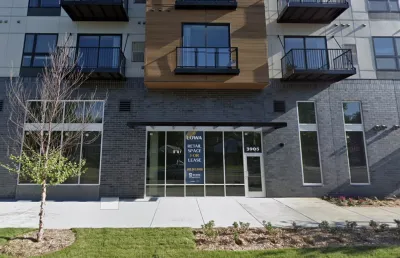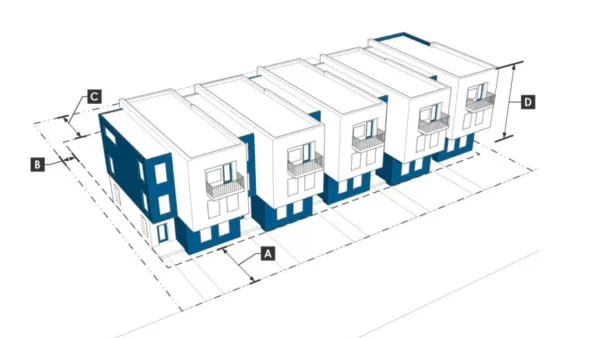Minneapolis developers are agitating against the requirements of mixed-use zoning, saying that it's impossible to find a good tenant for ground floor retail these days.

"Curt Gunsbury wants to replace a vacant parking lot and auto repair shop in northeast Minneapolis with a seven-story apartment building," according to an article by Jim Buchta and Dee DePass, but there's a catch. "City zoning rules say that because the site is in a commercial zone he’s required to devote a portion of the building to storefronts. Gunsbury says prospects to fill that space are dim."
Gunsbury points to empty storefronts on the blocks near the proposed developments as evidence of the difficulties of filling any ground floor retail, and also says that empty retail space is passed on to apartment tenants in the cost of higher rents.
"So Gunsbury plans to ask the city for permission to replace some of that required commercial space with walk-up apartments, which are easier to fill than retail," report Buchta and DePass.
According to the article, Gunsbury is far from alone. "With rising commercial vacancy rates in the Twin Cities, developers are imploring city planners to let them build more apartment units on the street level where commercial space is now required. While planning departments try to make cities more livable with such mixed-use projects, developers argue vacant commercial space increases rents at a time when renters can least afford it. Plus lenders are less willing to finance such projects."
Mixed-use development is desired by planners for its benefits in creating walkable, urban neighborhoods, and according to this article, the concept still has political support. Minneapolis City Council Member Andrew Johnson, for example, is quoted in the article saying developers should reevaluate their commercial rents and place smaller, independent retailers in some of the vacant spaces.
Jeffrey Herman, president of Urban Anthology Commercial Real Estate in Minneapolis, is quoted in the article arguing that COVID-19 is gutting urban commercial markets, in Minneapolis and elsewhere. Not coincidentally, Conor Dougherty and Peter Eavis wrote an article in June 2020 making a similar case, but for the real estate market in New York City.
FULL STORY: 'Nobody wants it.' Twin Cities developers push back on mandated storefronts in apartment buidings

National Parks Layoffs Will Cause Communities to Lose Billions
Thousands of essential park workers were laid off this week, just before the busy spring break season.

Retro-silient?: America’s First “Eco-burb,” The Woodlands Turns 50
A master-planned community north of Houston offers lessons on green infrastructure and resilient design, but falls short of its founder’s lofty affordability and walkability goals.

Delivering for America Plan Will Downgrade Mail Service in at Least 49.5 Percent of Zip Codes
Republican and Democrat lawmakers criticize the plan for its disproportionate negative impact on rural communities.

Test News Post 1
This is a summary

Test News Headline 46
Test for the image on the front page.

Balancing Bombs and Butterflies: How the National Guard Protects a Rare Species
The National Guard at Fort Indiantown Gap uses GIS technology and land management strategies to balance military training with conservation efforts, ensuring the survival of the rare eastern regal fritillary butterfly.
Urban Design for Planners 1: Software Tools
This six-course series explores essential urban design concepts using open source software and equips planners with the tools they need to participate fully in the urban design process.
Planning for Universal Design
Learn the tools for implementing Universal Design in planning regulations.
EMC Planning Group, Inc.
Planetizen
Planetizen
Mpact (formerly Rail~Volution)
Great Falls Development Authority, Inc.
HUDs Office of Policy Development and Research
NYU Wagner Graduate School of Public Service





























